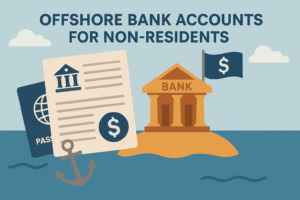Managing money across borders can be challenging.
Offshore bank accounts for non-residents provide a flexible solution for individuals who live, work, or invest internationally.
In this article, we’ll answer common questions about offshore banking and explore the following key points:
- Can I open a bank account in a country I don’t live in?
- What is the easiest country to open a non-resident bank account?
- What is the minimum deposit for an offshore bank account?
- How to withdraw money from an offshore account?
- What are the disadvantages of offshore bank accounts?
- Is your money safe in an offshore bank account?
If you are looking to invest as an expat or high-net-worth individual, which is what I specialize in, you can email me (hello@adamfayed.com) or WhatsApp (+44-7393-450-837).
This includes if you are looking for a free expat portfolio review service to optimize your investments and identify growth prospects.
Some facts might change from the time of writing. Nothing written here is financial, legal, tax, or any kind of individual advice or a solicitation to invest.

Can You Have an Offshore Bank Account as a Non-Resident?

Yes, and in fact, it’s more common than many people think.
Non-residents, defined as individuals who do not legally reside in a country but wish to access its banking system, can open offshore accounts in a number of jurisdictions.
The process is legal and widely used by expats, international investors, and globally mobile professionals.
Compliance with anti-money laundering (AML) laws, know-your-customer (KYC) protocols, and tax reporting regulations like FATCA or Common Reporting System (CRS) is essential.
Reasons to open an offshore account for non-residents
There are many valid reasons to bank offshore as a non-resident: access to foreign currency accounts, asset protection, international investment opportunities, and greater financial privacy.
It also enables easier management of cross-border transactions for those with global lifestyles or business interests.
Countries That Allow Non-Residents to Open Bank Accounts
Many jurisdictions permit non-residents to open personal or business bank accounts.
Some of the top countries include:
- Cayman Islands – Seamless account opening, low tax rates with strong financial regulation.
- Mauritius – Popular with investors and expats with remote options available; offers ease of opening
- Belize – Offers high financial stability and low deposit options.
- Singapore & Hong Kong – Stable financial systems, though may require higher deposits.
- United Arab Emirates (UAE) – Attractive for wealth management and multi-currency accounts with favorable tax laws.
- Switzerland – High privacy standards.
Common Requirements to Open Offshore Bank Accounts for Non-Residents
To open offshore bank account for non-residents, it typically involves:
- Valid passport and possibly a second form of ID
- Proof of address (can be your home country)
- Source-of-funds documentation (employment letter, investment income, etc.)
- Banking reference letter or proof of an existing relationship with another financial institution
- Tax identification number (varies by jurisdiction)
Some banks may ask for an in-person visit, while others allow video or online verification.
Digital vs. Traditional Offshore Banking
- Digital offshore banks:
Fintech platforms and challenger banks now offer non-resident account options with easy online onboarding. These are ideal for freelancers, remote workers, and small business owners. - Traditional offshore banks:
These may offer more robust wealth management and investment services, but the entry barriers are often higher, requiring minimum deposits or physical presence.
What Is the Minimum Amount to Open an Offshore Account?
The answer varies widely depending on the country, the bank, and whether the account is personal or corporate.
Most offshore banks cater to high-net-worth individuals, while others are accessible to everyday expats and investors.
Minimum deposit requirements can range from nominal amounts to hundreds of thousands. Some banks offshore can allow around a $1k deposit for basic accounts.
Personal vs. Corporate Offshore Accounts
- Personal accounts:
- Lower minimums in most jurisdictions.
- Can start from $0, especially with digital banks.
- Easier KYC (Know Your Customer) process.
- Corporate accounts:
- Typically require higher initial deposits.
- Involves additional paperwork like company incorporation documents and business plans.
How to Withdraw Money from an Offshore Account
Withdrawing money from an offshore bank account is relatively straightforward but can vary depending on the bank’s location, the account type, and your chosen method of transfer.
Here’s how it typically works:
Wire Transfers and Global Banking Networks
- SWIFT network: Most offshore banks are connected to the SWIFT system, enabling secure international wire transfers to your local bank.
- Correspondent banks: Some offshore institutions work with intermediary banks in major financial hubs to facilitate smoother cross-border payments.
- Transfer times: International wires may take 1–5 business days depending on the destination country and bank relationships.
Fees in offshore bank withdrawal
- Foreign exchange spreads: If your offshore account is denominated in USD, EUR, or GBP but your home country uses a different currency, banks may charge around 4% above mid-market exchange rates.
- Transfer fees: Offshore banks often charge $5–$75 per international wire, plus potential intermediary bank fees.
- ATM withdrawals: Some offshore banks issue international debit cards, but usage abroad may incur currency conversion and foreign ATM charges.
Practical Tips for Accessing Funds Globally
- Use multicurrency accounts to reduce conversion costs when transferring to different countries.
- Plan larger, less frequent transfers to minimize wire fees.
- Confirm local regulations on receiving foreign funds, especially in countries with tight foreign exchange controls.
- Maintain a local account in the same currency as your offshore account (e.g., USD or EUR) to simplify transfers and reduce costs.
Offshore accounts are designed to provide global access to capital, but managing fees and timing is key to maximizing efficiency.
Always compare transfer costs and timelines before initiating a withdrawal.
What Are the Disadvantages of Offshore Accounts?
While offshore banking offers benefits like asset protection, privacy, and global access, it also comes with several potential drawbacks that are important to weigh carefully especially for non-resident account holders.
1. Regulatory Scrutiny and Compliance Burdens
One of the main disadvantages of offshore bank accounts for non-residents is the increased level of scrutiny.
International financial institutions are required to comply with Anti-Money Laundering and Know Your Customer regulations, which means opening and maintaining an account often involves submitting detailed documentation.
Additionally, account holders from countries like the US, UK, or EU may be subject to automatic exchange of financial information under frameworks such as FATCA or the CRS.
This means offshore accounts are far from anonymous and must be reported for tax purposes.
2. Potential High Fees and Limited Banking Services
Offshore accounts, especially those in private or boutique banks, can come with higher fees than local bank accounts.
These may include:
- Minimum balance charges
- Monthly maintenance fees
- Wire transfer costs
- Foreign exchange markups
In some jurisdictions, banking services may also be less accessible or slower, particularly if the bank is in a time zone far from your country of residence or lacks digital banking infrastructure.
3. Perception and Stigma of Offshore Banking
Despite being legal, offshore banking often carries a negative reputation due to its historical association with tax evasion or illicit activity.
This stigma can create complications when:
- Explaining your finances to tax authorities
- Applying for loans or mortgages
- Receiving money from or sending to an offshore account
Being transparent about your offshore holdings and ensuring full legal compliance helps mitigate this issue, but the perception risk remains, especially in more conservative banking or tax jurisdictions.
Is Your Money Safe in an Offshore Account?
Offshore banking can be a secure way to diversify your wealth internationally, but the safety of your funds depends heavily on the jurisdiction, the financial institution you choose, and how well you comply with legal requirements.
Jurisdictional Stability and Bank Ratings
The safety of your offshore money starts with the country and bank you choose.
Reputable financial hubs like Singapore, Switzerland, and the UAE are known for their political stability and strong regulatory environments.
It’s also critical to choose banks with high credit ratings from agencies like Moody’s, S&P, or Fitch.
Deposit Insurance
Unlike domestic accounts that may benefit from deposit insurance schemes like FDIC in the US or FSCS in the UK, many offshore banks do not offer deposit guarantees.
Some jurisdictions offer partial protection, but it’s often limited or conditional.
As a result, doing due diligence on the bank’s financial health becomes essential.
Compliance and Proper Documentation
Safety also means avoiding legal and regulatory issues.
Ensure your offshore account is properly declared in your home country and that you comply with KYC and AML rules.
Failure to do so can lead to frozen assets or legal penalties, not because offshore accounts are unsafe, but because they were used improperly.
Final Thoughts
So, is your money safe in an offshore account?
Yes, if you bank in a stable jurisdiction, choose a reputable institution, and comply with all legal and tax reporting obligations.
With those safeguards in place, offshore banking can be a powerful tool for privacy, asset protection, and global diversification.
Pained by financial indecision?

Adam is an internationally recognised author on financial matters with over 830million answer views on Quora, a widely sold book on Amazon, and a contributor on Forbes.




Thank you for the information.
But you didn’t mention about taxation in that offshore country.
Is it tax free and including VAT free.
Comparing Free Trade Zone and Offshore in regard to taxation, which one is better.
In most of these countries you don’t pay tax to that country, but you do pay tax to the country where you are living.